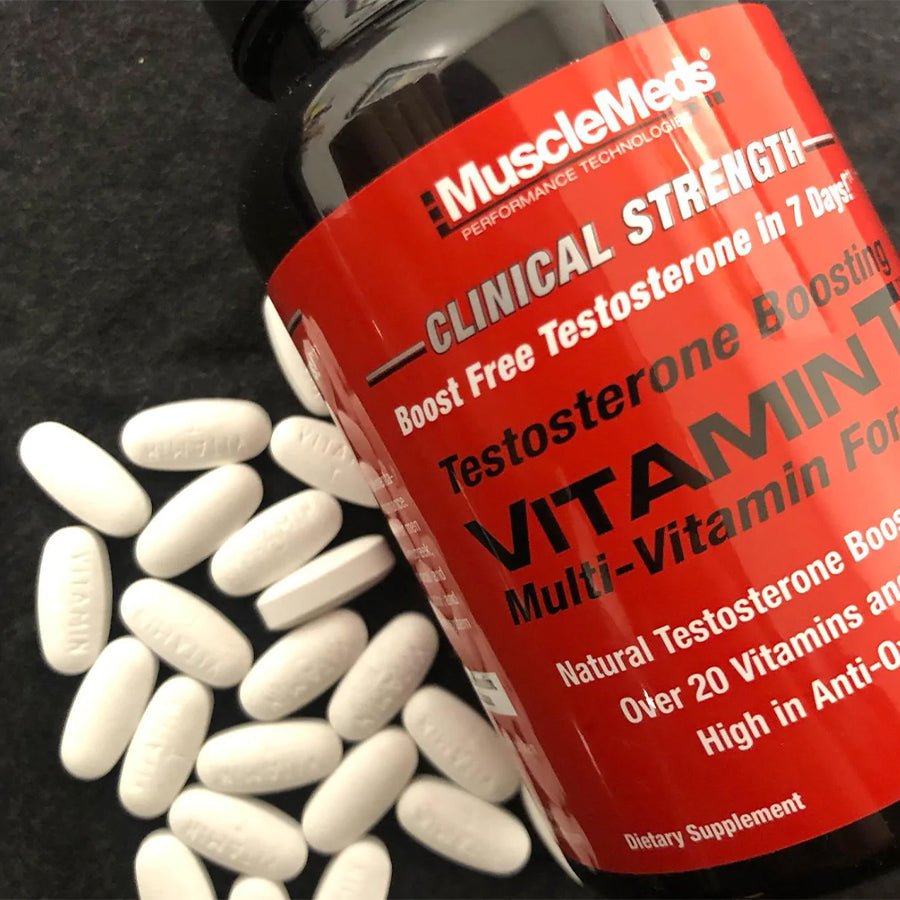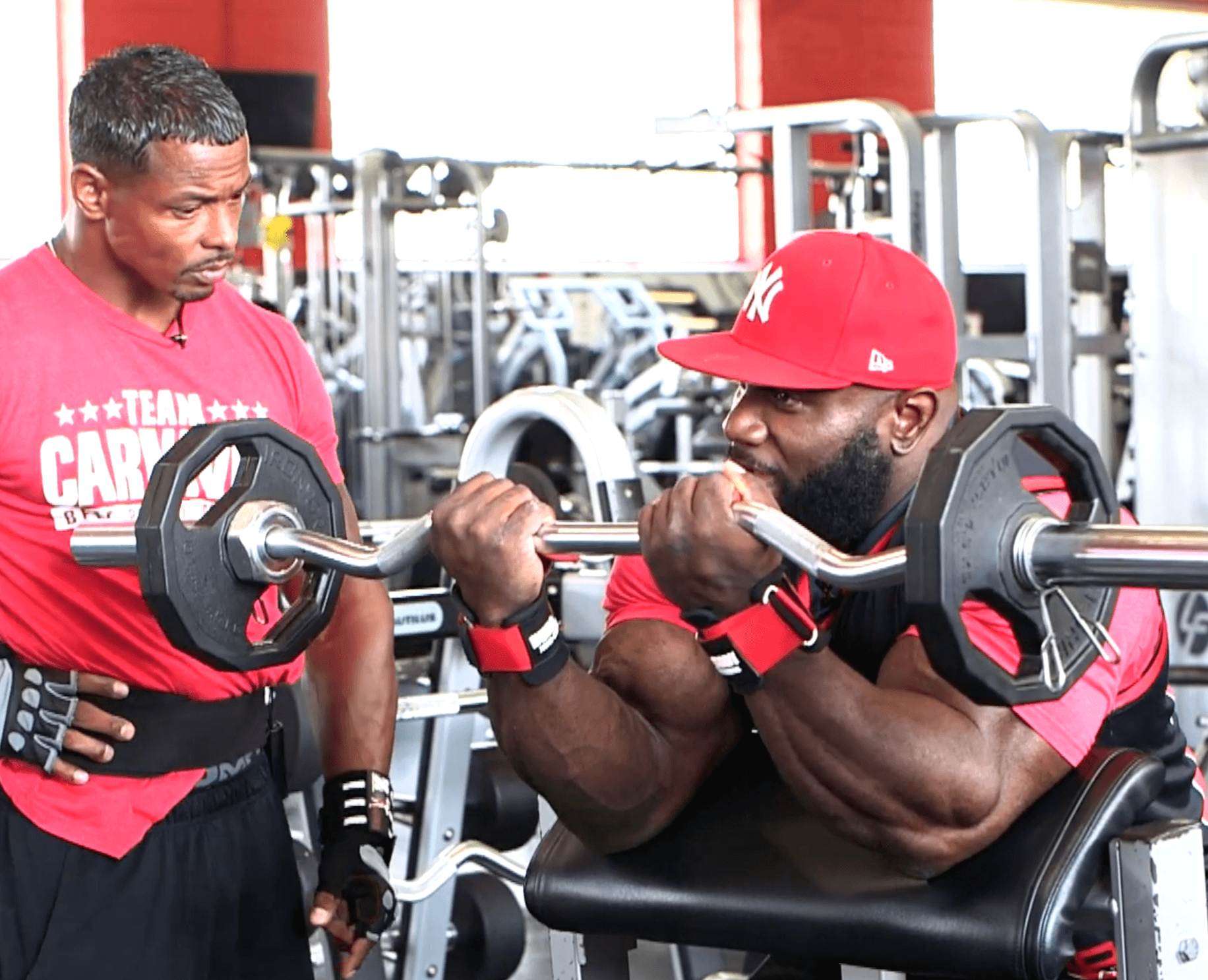Plenty of things are sagging and dropping these days, but even worse than some parts of your body or the stock market is your level of total testosterone. Testosterone levels have decreased steadily for decades among young U.S. men between past and current generations. And research demonstrates that the critical male hormone testosterone starts to drop in adolescence – this is not just a problem for men in their 50s. How do you fight back and win the war against low T? Arm yourself with VITAMIN T™.
Because testosterone plays a key role in a man’s physical and sexual performance, it’s important that all men address healthy testosterone levels, which is why MuscleMeds developed VITAMIN T™ – a premium testosterone-support formula and complete multivitamin specially formulated for men.†
Enhance Testosterone Naturally
Testosterone has a plethora of important functions. Receptors for testosterone are found in almost all tissues, and it contributes to lean body mass, bone health, cognitive function and mood, and the production of sperm. VITAMIN T™ is a high-potency multivitamin formulated to provide natural testosterone support.†
Higher testosterone levels will help you build more muscle, recover faster and perform better in the bedroom. Low testosterone, on the other hand, can result in erectile dysfunction, reduced bone mass and sex drive, loss of muscle, increased body fat and lethargy. Seems like a no-brainer: No man should ever ignore the importance of proper nutrition and supplementation to support healthy testosterone levels for optimal male performance. The research and development team at MuscleMeds has formulated VITAMIN T™ with clinically researched herbs and minerals and potent antioxidants to support testosterone naturally, to improve physical and sexual performance.†

Your T Levels Are Dropping
You may not realize it, but your testosterone levels are dropping as you read this. According to results presented at the 2020 American Urological Association Virtual Experience and reported in Urology Times Journal, testosterone levels have declined in adolescent and young adult men (AYA) from 1999 to 2016. Put another way, today’s men are not the men their fathers were in the testosterone department. And the decline in total testosterone was observed even among men with normal body mass index – so dropping testosterone is happening regardless of whether you are carrying a few extra pounds.
Lokeshwar et al. used data from the National Health and Nutrition Examination Surveys (NHANES) from 1999 to 2016 to analyze serum testosterone level changes over time in 4,045 young adult men aged 15 through 39. After controlling for confounders – including year of study, age, race, BMI, comorbidity status, alcohol and smoking use, and level of physical activity – researchers found that total testosterone was lower among men in later (2015-2016) versus earlier (1999-2000) years.

‘Very scary’
Testosterone deficiency has a prevalence of 20% among adolescent and young adult males. Although previous studies have shown that total testosterone (TT) levels are declining in the population compared to prior decades, Lokeshwar et al. identified falling TT levels for AYA males specifically.
“This is especially worrisome in this young adult age group, as many men feel stigma and are less likely to seek care for low libido and erectile dysfunction,” said Soum Lokeshwar, MD, MBA of the Yale School of Medicine.
“Testosterone levels in AYA men are used as the benchmark normal levels for testosterone,” Lokeshwar continued. “This is very scary, because generally, when we think of normal values of testosterone, we treat based upon this age group. This may ultimately lead to the undertreatment of testosterone deficiency, which can have large ramifications and severe consequences.”
What Causes Low T?
Lokeshwar said possible causes for TT declines could be a result of obesity and declines in exercise and physical activity, and higher body fat percentages.
“We’ve seen that lower values of testosterone have been associated with increased comorbidities and an increase risk for all-cause mortality. This decline specifically, in these young adult men, with increased obesity may lead to an increase in precocious cancer,” Lokeshwar said, adding such decreases can also result in a lower libido and an increased risk for erectile dysfunction.
Other causes of lower testosterone in younger men may include fasting, low-fat diets, ketogenic diets, overtraining, alcohol, statins (cholesterol-lowering drugs), chronic stress, lack of sleep, and environmental endocrine disruptors such as Bisphenol A (in polycarbonate plastics) and Phthalates (found in plastics and many cosmetics).
For testosterone support, VITAMIN T™ contains 500 milligrams of Fenugreek, 200 milligrams of Tribulus, 100 milligrams of Longjack and 200 milligrams Boron Citrate.† VITAMIN T™ also contains potent antioxidants such as vitamins C and E to support the immune system and optimal male health.†
Look, Feel and Perform at Your Best
The choice is yours: you can get up every day and choose to be the best version of yourself possible, directing your own course in life to one of optimal health and performance. If you want to look, feel and perform at your best, VITAMIN T™ is the multivitamin for you.
†These statements have not been evaluated by the U.S. Food and Drug Administration. This product is not intended to diagnose, treat, cure or prevent any disease.
VITAMIN T™
- Natural Testosterone Support
- Supports Lean Muscle
- Improves Performance
- Enhances Libido
- 20 Vitamins and Minerals
- Potent Antioxidants
High Potency Multivitamin for Men
- 500 mg Fenugreek
- 200 mg Tribulus
- 200 mg Boron Citrate
- 100 mg Longjack

References:
- Naghii MR, Mofid M et al. Comparative effects of daily and weekly boron supplementation on plasma steroid hormones and proinflammatory cytokines. Physiology and Pharmacology 2011; 15 (3), 403-414.
- Kristie L Kahl. Urology Times Journal, July 3, 2020; Vol 48 No 7, Volume 48, Issue 07.
- Soum D Lokeshwar, et al. Decline in Serum Testosterone Levels Among Adolescent and Young Adult Men in the USA. Eur Urol Focus, 2021 Jul;7(4):886-889.
- Shufa Zheng et al. Serum level of testosterone predicts disease severity of male COVID-19 patients and is related to T-cell immune modulation by transcriptome analysis. Clin Chim Acta, 2022 Jan 1;524:132-138.
- A Klibanski et al. Reproductive function during fasting in men. J Clin Endocrinol Metab, 1981 Aug;53(2):258-63.
- Tatiana Moro et al. Effects of eight weeks of time-restricted feeding (16/8) on basal metabolism, maximal strength, body composition, inflammation, and cardiovascular risk factors in resistance-trained males. Journal of Translational Medicine, volume 14, Article number 290 (2016)
- Anthony C Hackney. Hypogonadism in Exercising Males: Dysfunction or Adaptive-Regulatory Adjustment? Front Endocrinol, 31 January 2020.
- DM Kelly et al. Testosterone and obesity. Obes Rev, 2015 Jul.
- M Diaz-Arjonilla et al. Obesity, low testosterone levels and erectile dysfunction. Int J Impot Res, Mar-Apr 2009.
- Mark Ng Tang Fui et al. Lowered testosterone in male obesity: mechanisms, morbidity and management. Asian J Androl, Mar-Apr 2014.
- Overweight men can boost low testosterone levels by losing weight. Endocrine Society; June 25, 2012.
- Haibo Jin et al. Chronic exposure to polystyrene microplastics induced male reproductive toxicity and decreased testosterone levels via the LH-mediated LHR/cAMP/PKA/StAR pathway. Part Fibre Toxicol, 2022.
- Pai Zheng et al. Association between ambient air pollution and blood sex hormones levels in men. Environmental Research, Volume 211, August 2022.
- Reduced testosterone tied to endocrine-disrupting chemical exposure. Endocrine Society, August 14, 2014.
- Ylenia Duca et al. Substance Abuse and Male Hypogonadism. J Clin Med, 2019 May 22;8(5):732.
- Tzu-Yu Hu et al. Testosterone-Associated Dietary Pattern Predicts Low Testosterone Levels and Hypogonadism. Nutrients, 2018 Nov; 10(11): 1786.
- Joseph Whittaker et al. Low-fat diets and testosterone in men: Systematic review and meta-analysis of intervention studies. J Steroid Biochem Mol Biol, 2021 Jun.
- Hideyuki Imai et al. Secondary Hypogonadism due to Excessive Ingestion of Isoflavone in a Man. Intern Med 2022.
- Maarten C Bosland et al. Impact of 18-Month Soy Protein Supplementation on Steroid Hormones and Serum Biomarkers of Angiogenesis, Apoptosis, and the Growth Hormone/IGF-1 Axis: Results of a Randomized, Placebo-Controlled Trial in Males Following Prostatectomy. Nutr Cancer, 2022;74(1):110-121.
- Xiaofan Xiong et al. Chronic stress inhibits testosterone synthesis in Leydig cells through mitochondrial damage via Atp5a1. J Cell Mol Med, 2022 Jan;26(2):354-363.
- Sleep loss dramatically lowers testosterone in healthy young men. ScienceDaily, JAMA and University of Chicago Medical Center, June 1, 2011.
- Rachel Leproult, Ph.D. and Eve Van Cauter, Ph.D. Effect of 1 Week of Sleep Restriction on Testosterone Levels in Young Healthy Men. JAMA. 2011;305(21):2173-2174.



